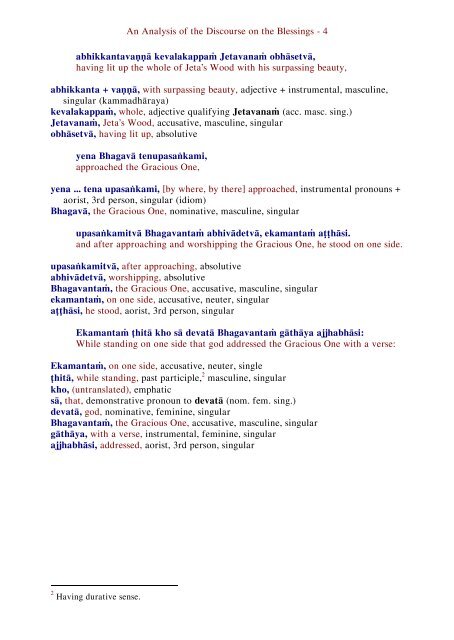Tisuttanirutti, A Grammatical Analysis of Three Discourses
A complete grammatical analysis of three of the most important discourses of the Pāli Canon (Maṅgala, Ratana and Mettā), showing relationship and meaning.
A complete grammatical analysis of three of the most important discourses of the Pāli Canon (Maṅgala, Ratana and Mettā), showing relationship and meaning.
Create successful ePaper yourself
Turn your PDF publications into a flip-book with our unique Google optimized e-Paper software.
An <strong>Analysis</strong> <strong>of</strong> the Discourse on the Blessings - 4<br />
abhikkantavaṇṇā kevalakappaṁ Jetavanaṁ obhāsetvā,<br />
having lit up the whole <strong>of</strong> Jeta’s Wood with his surpassing beauty,<br />
abhikkanta + vaṇṇā, with surpassing beauty, adjective + instrumental, masculine,<br />
singular (kammadhāraya)<br />
kevalakappaṁ, whole, adjective qualifying Jetavanaṁ (acc. masc. sing.)<br />
Jetavanaṁ, Jeta’s Wood, accusative, masculine, singular<br />
obhāsetvā, having lit up, absolutive<br />
yena Bhagavā tenupasaṅkami,<br />
approached the Gracious One,<br />
yena ... tena upasaṅkami, [by where, by there] approached, instrumental pronouns +<br />
aorist, 3rd person, singular (idiom)<br />
Bhagavā, the Gracious One, nominative, masculine, singular<br />
upasaṅkamitvā Bhagavantaṁ abhivādetvā, ekamantaṁ aṭṭhāsi.<br />
and after approaching and worshipping the Gracious One, he stood on one side.<br />
upasaṅkamitvā, after approaching, absolutive<br />
abhivādetvā, worshipping, absolutive<br />
Bhagavantaṁ, the Gracious One, accusative, masculine, singular<br />
ekamantaṁ, on one side, accusative, neuter, singular<br />
aṭṭhāsi, he stood, aorist, 3rd person, singular<br />
Ekamantaṁ ṭhitā kho sā devatā Bhagavantaṁ gāthāya ajjhabhāsi:<br />
While standing on one side that god addressed the Gracious One with a verse:<br />
Ekamantaṁ, on one side, accusative, neuter, single<br />
ṭhitā, while standing, past participle, 2 masculine, singular<br />
kho, (untranslated), emphatic<br />
sā, that, demonstrative pronoun to devatā (nom. fem. sing.)<br />
devatā, god, nominative, feminine, singular<br />
Bhagavantaṁ, the Gracious One, accusative, masculine, singular<br />
gāthāya, with a verse, instrumental, feminine, singular<br />
ajjhabhāsi, addressed, aorist, 3rd person, singular<br />
2 Having durative sense.


















